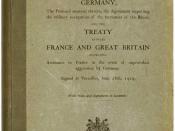After four years, three months and fourteen days of the prolonged First World War, the Germans surrender and signed an armistice on November 11th, 1918, as a result of the civilians who were ecstatic to see an end to their starvation. However, the Germans knew they would have to pay a price for piece as a defeated nation. To ensure an extensive peace, a treaty was formed by the winners of the war, but France, the United States and Great Britain were the "Big Three" envoys in the creation of this peace treaty. The Germans were not invited to these negotiations, and it soon became evident that the Germans were not going to receive a lenient treaty as they had hoped for. The representatives of the 28 nations gathered in the Hall of Mirrors at the Palace of Versailles on June 28th, 1919, when they handed the treaty to German representatives of the Weimar government who reluctantly signed the treaty, which was later named "The Shameful Dictat of Versailles" because of its harsh conditions and humiliating terms.
In this essay I will be analyzing the reasons for the main terms of the Treaty of Versailles and the subsequent damaging consequences.
As different nations, the "Big Three" wanted different conditions for the treaty, as there were different points of view. The French representative, Clemenceau, believed in revenge and promised to make Germany pay for all the repairs of France and admit that they alone had provoked the war. He wanted to humiliate Germany for all the suffering and embarrassment they had caused to France in the wars, and weaken Germany so dreadfully that it would never be capable or dare to attack France again. The British Prime Minister, David Lloyd, also believed that Germany should pay. However, he feared the...



Good analysis
You analized the fact well, but couldn't you have been a little more specific about what the actual text of the terms were? I've never actually read a copy of the document myself, only what other people have written and documentaries, your points would be clearer if you included the basis from which they come.
2 out of 6 people found this comment useful.